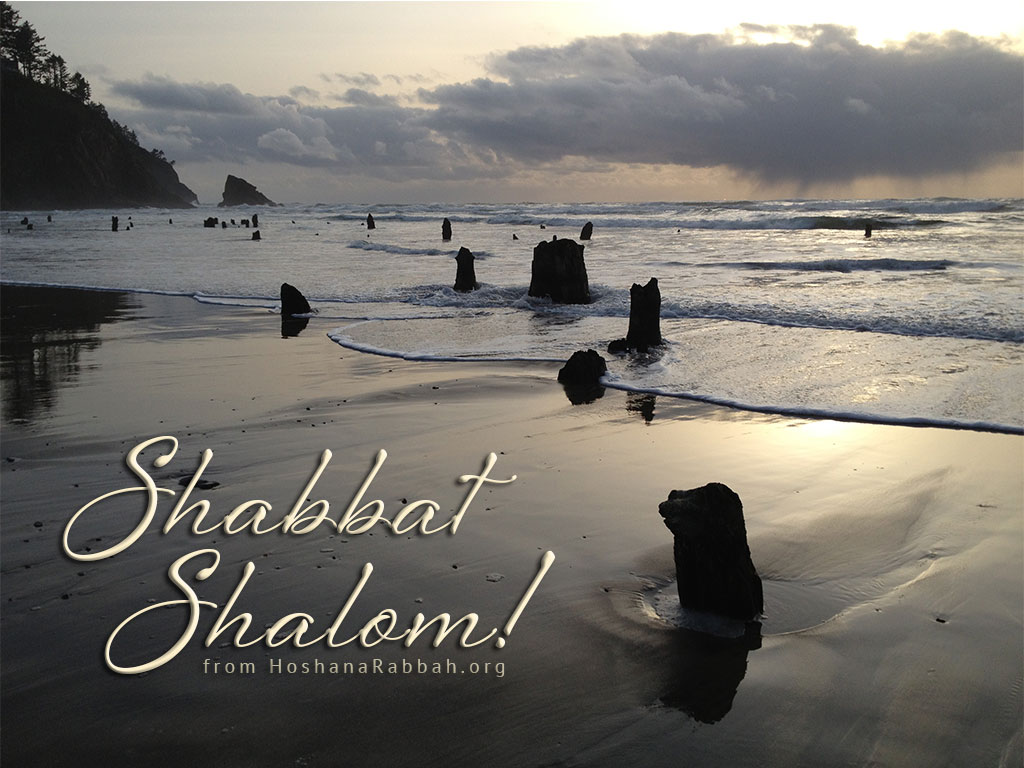I’ve just uploaded two new short videos answering the following questions:
- What does the Bible say about how to keep the Sabbath?
- What is the unpardonable sin, and can a person lose their salvation?
Enjoy!

 My wife Sandi and I are spending the weekend at the world class scenic Oregon Coast, which is about an hour-and-a-half drive from our home. Today, Shabbat, is our anniversary. Twenty-two years and four children ago, we were married on this day.
My wife Sandi and I are spending the weekend at the world class scenic Oregon Coast, which is about an hour-and-a-half drive from our home. Today, Shabbat, is our anniversary. Twenty-two years and four children ago, we were married on this day.
From one of my business clients, we have rented their beach home that overlooks the mighty Pacific Ocean.
As the sun was setting, from the picture window of the house, I saw some cool light patterns on the beach, so I quickly put on my boots and donned my heavy jacket and headed down to the edge of the ocean where I snapped this photo.
Interestingly, the stumps sticking up out of the sand are a story unto themselves. They are a unique geological feature that is known as the Neskowin Ghost Forest. You can Google this and read about it. In brief, these tree trunks aren’t driftwood or old pier pilings. Rather, they are the remnants of an old Sitka Spruce forest that 1700 years ago sat perched on a knoll just above the beach. Due to an earthquake, the bank slipped into the beach area and the trees were submerged under water and sand where they were preserved until about 15 years ago. At that time, some violent storms eroded the sand away from these old trees exposing them for the first time.
Some of these now barnacle-encrusted spruce trees were originally six feet in diameter. I found one stump on the beach that is still about five feet in diameter, which means it was hundreds of years old when it was buried 1700 years ago. This stump was probably already several hundred years old when Yeshua was born! Imagine this! Here’s a close up picture of this ancient wonder. I placed my hat next to it for size comparisons purposes.
I am continually in awe of the wonders of YHVH Elohim’s creation. It speaks silently, yet at the same time shouts loudly for those who have ears to hear, of the unfathomable greatness of our Creator.
This Sabbath, please join me in giving YHVH Yeshua, the Creator of all things, the praise He deserves for all that He has done, all that He is, and for the salvation He has given you and me!
John 5:18, [Yeshua]… broke the Sabbath. Listen to an interesting and sad, but true story. Many years ago, I was in a meeting where a Christian Bible teacher was giving a message on the end times. In the middle of his teaching and totally out of context, he quoted this passage from John and claimed that Yeshua broke the Sabbath. There was a rustle in the audience of about 300 people. A little later, he made the same statement again and began to deride the Sabbath. This time there was an audible moan from some in the audience — many of whom were Sabbath keepers. A feeling of being hit in the gut went through me. A little later, he made the same statement again, and continued to bash Sabbath observance. This time, I could hold my peace no longer, and I stood up and challenged him in the middle of the meeting. I told him that to say that Yeshua had broken the Sabbath was to call Yeshua a sinner, and that Yeshua had not broken the Sabbath, but some Jewish legal traditions (or halakhah) pertaining to the Sabbath. The speaker was flustered and had no response, and the host of the meeting decided to take an intermission.
A year later, it was announced that this Bible teacher had suddenly and unexpectedly dropped dead in the pulpit while preaching. One can’t help but wonder…

Yeshua didn’t come to set men free from the Sabbath. He came to set the Sabbath free from men’s unbiblical traditions.
Had this false teacher simply pulled down a concordance from his bookshelf and looked up the word broke in the Greek, and had read John’s statement in verse 12 in the context of verses 8–10, he wouldn’t have been teaching this blasphemous heresy about our Master and Savior!
Here is the explanation of this passage: The word broke Continue reading
What can I do on the Sabbath? This is a question that many people have—especially our children. The Sabbath can be a joyful and exciting day.
As we look to the Bible for answers to this question, we find many wonderful possibilities to make this day not only enjoyable, but spiritually meaningful and edifying.
As we study the Scriptures, we see that certain activities were viewed to be within the perimeters of the purpose of the Sabbath, which is to draw humans closer to Elohim, their Creator, and to one another. These activities include…
Most of these principles apply to the seven biblical feasts as well.
Now a question for you the reader: What are some Sabbath activities that you do that not only honor YHVH and the Sabbath, but bring you into a closer relationship with him and our fellow redeemed Israelites? How about for the kids? How can we keep them excited about the Sabbath?
One possibility of a Sabbath activity is our Torah Explorers Torah study guide for young people available for free at http://www.hoshanarabbah.org/parshiot.html. My adult Torah study guide is located at this link as well. Enjoy!
The Glue That Holds a Family and Spiritual Community Intact
As a Jewish saying goes, even though the Jewish people have been keeping the Sabbath for thousands of years, it’s not that the Jews have been keeping the Sabbath, but rather that the Sabbath has been keeping the Jews. As a weekly rallying point, the Sabbath acts a spiritual glue that helps to hold the family and religious community together.
The joy, peace, timelessness and eternal nature of the Sabbath is felt no more than on Erev Shabbat (the eve of the Sabbath).
Preparations in the home have been made all week for this family and community event. Expectations are high. It is as if a curtain suddenly drops between acts in a theater and the curtain lifts to reveal a completely new set and scene. “Suddenly, the frenzied pace of life is slowed; the concerns of the outside world recede; and all doubts and worries are set aside” ( Abraham B.Witty, Exploring Jewish Tradition, p. 153). It’s a whole new world, a whole new feeling. Time stops. It is time to focus on those things which are of the greatest meaning in life and which are of enduring and eternal value: one’s Creator, one’s family, and spiritual orientation and instruction.
At this point, if the reader happens to own the movie Fiddler On the Roof, I suggest that you play the part at the beginning of the movie where the Jewish society prepares for the Sabbath and then ushers in the Sabbath over the Friday evening meal. After viewing this, one will have a better idea of the idea of the sanctity of the Sabbath and the central role it plays in the Hebrews’ life. As one author notes, “A[n] … important principle concerning the stability of the Jewish family is seen in the description of the Sabbath observance that is given in Fiddler [on the Roof]. In the small village of Anatevka in pre-Communist Russia, there is a sense of joyous anticipation as the Sabbath draws near (see Isa 58:13). The seventh day of the week is a dramatic symbol of community. It may be summed up in the word holiness. For Tevye and his family, holiness means an act of separation from many of the routine and mundane affairs of life. From the moment Golde, his wife, lights the Sabbath Eve candles until the first star appears in the sky some twenty-four hours later, there is a sense of wellbeing and spiritual satisfaction in the midst of their seething society. The Jewish community of Anatevka is in constant threat of another Russian pogrom. Yet we catch a snatch of this spiritual serenity as, around the Sabbath table, Tevye and Golde sing “A Sabbath Prayer” to all five daughters. The song concludes, ‘May YHVH protect and defend, may YHVH preserve you from pain. Favor them, O Lord, with happiness and peace. O hear our Sabbath prayer. Amein’” (Our Father Abraham: Jewish Roots of the Christian Faith, by Marvin Wilson, pp. 223–224).
The Sabbath has helped the observant Jew to refocus, sustain serenity and regain divine perspective in the midst of the weekly pressures of life, so ought “the Lord’s Day [Sunday] for the Christian ought … provide renewal in similar ways” (Wilson, pp. 223–224). Although a nice thought, the comparison between Sabbath and Sunday is without scriptural precedence or mandate. Such thinking ignores the divinely revealed truth and reality of the Sabbath and its uniqueness and sanctity as compared to any other day of the week, including Sunday for the Christians—a day which never has been, nor ever will be sanctified by the Creator of the Universe as a day of rest from our work and a time for special communion with him.